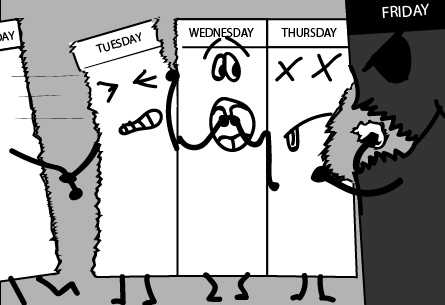Sale! Sale! The year’s best deals, the lowest prices, the biggest crowds — all encroaching on a holiday near you!
Since its earliest usage by police officers dealing with traffic jams in 1960s Philadelphia, the name “Black Friday” has carried a negative connotation. Boon of deal-hunting shoppers and bane of overworked staffers, the day has increasingly taken bites out of Thanksgiving in search of higher corporate profits. Wal-Mart, Target and Macy’s all plan to open their doors at 6 p.m. Thanksgiving Day, two hours earlier than last year.
Why have retailers made the season more about riding the gravy train instead of passing the gravy boat? The way corporations continue carving into the day itself sounds like something Ebenezer Scrooge from Charles Dickens’ “A Christmas Carol” might do.
Big box stores have struggled to keep their seat at the table as Internet retailers like Amazon continue to siphon away large portions of the shopping populace. In 2013, Amazon made $67.8 billion in online sales, while Wal-Mart’s online efforts earned only $10 billion. Without the holiday season revenue stream, these stores could dry up completely, so it’s no wonder that they keep trying to eat up a few more hours of turkey day.
According to a recent Nielsen study, advertisers spent nearly $2.5 billion on television commercials during the 2013 fiscal year’s fourth quarter — i.e., the holiday season. As recent years have not seen much in terms of net economic growth, these advertisements aim to win over uncertain buyers and push the more confident ones into splurging a tiny bit more on their holiday shopping. So far, it seems to be working: consumers surveyed for the Nielsen study said they planned to spend more money on gifts this year than last.
But the study also reports only 22 percent of those people have begun their shopping. The rest, including 70 percent of the male consumers, are waiting for the last minute.
Perhaps some dormant primal instinct awakens in these late-goers: the thrill of the hunt for a great deal, satisfied by nabbing the last item off the shelves. Crowd psychology must also come into consideration — it’s hard to remain an individual when the mob presses against the doors, with every member focused on getting the maximum on all those bargains.
Retail personnel have to learn how to deal with some of the more ignorant and insensitive members of the population, even during the rest of the year. But when Black Friday’s “doorbuster” sales actually do result in busted doors and fatal consequences, as in a 2008 case where Black Friday shoppers in New York trampled a Wal-Mart employee to death, these workers are far outmatched by the consumers they try to serve.
The day after Thanksgiving has become a lost cause, in terms of societal reform, but consumers should reject “Gray Thursday” before it turns into the status quo.
When Black Friday comes, Santa Rosa Junior College students will be standing on both sides of the door, as employees trying to keep up with the rush and as the patrons trying to push their way in.
For those working in the early hours of Friday morning, and especially for those forced to observe Thanksgiving on the job, we send our best wishes. Many of the Oak Leaf staff will be in the same stressful position.
The Oak Leaf staff also entreats those choosing to go for the sales on Friday to stay mindful of the stressful environment their fellow students face and to stay home on Thursday. No discount is worth not giving thanks.


